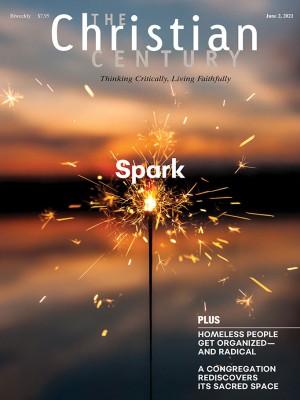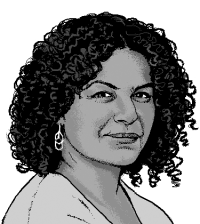
When I was three years old, my immigrant mother emptied out a closet in our Boston apartment—the only space she could spare—to make me a reading room. It was my father’s utility closet, filled with tools, light bulbs, and spare batteries, but she tossed the “man stuff” out, installed a tiny table and two chairs she’d found at a flea market, and christened the closet my “first school.”
Unable to afford fancy teaching materials, she cut words and pictures out of magazines and greeting cards and Scotch-taped them to the closet walls. I remember she took great care in arranging the scraps, setting them against each other as an artist sets the pieces of a collage.
Read our latest issue or browse back issues.
When the room was ready, my education in the English language began. Every morning, we’d sit at the tiny table, surrounded by my mother’s word-and-picture tapestry. She would point and I would read, matching pictures to letters, symbols to meaning. Kitten, puppy, horse, rainbow. Star, ball, leaf, sun. Our bodies pressed together, her gaze guiding mine, we feasted on words.
As soon as I’d master one set of images and letters, she would replace them with new ones—often at night, so I wouldn’t see the transformation until the next morning. I remember feeling as if the walls were alive—an organic, ever-changing picture book. Fence, cloud, table, pen. Girl, boy, rock, tree. As my skills improved, she taught me the words she considered more important and more beautiful than all others: “In the beginning, God.” “The Lord is my shepherd.” “For God so loved the world.” “And the Word became flesh.”
Within months, my mother’s project succeeded; I became both a bookworm and a self-proclaimed writer. I wrote poems, prayers, and stories in black-and-white composition notebooks, illustrating my masterpieces with crayons. I disappeared the second my mother walked me into Woolworth’s or Kmart, running to the children’s book display to choose a new book. Regardless of our family’s financial constraints, there was always money for one more book.
“A word after a word / after a word is power,” Margaret Atwood writes in her poem “Spelling.” I didn’t know it when I was a preschooler, but what my mother gave me in that makeshift schoolhouse was my first power: the power to revel in language, the power to name, declare, describe, and explore. The power to self-express and the power to seek.
Of course, language is never a benign thing, and in immigrant families in particular it has great power to divide. It didn’t take me long to grab my mother’s gift and run away with it. Too soon, I was more fluent and versatile in English than she was. By kindergarten, I no longer spoke with her Indian accent. By adolescence, I considered my Americanness and her South Asian-ness mutually exclusive. By my late twenties, the language of her devout Christian faith (evangelical and charismatic) and mine (progressive and liturgical) felt painful to bridge. Literally and figuratively, we lost our common language—though we both longed to recover it.
I wonder now if this is at once the most wonderful and most terrible thing one can say about a mother’s good gifts. The best gifts are costly. They wound. They send a child away. My mother’s closet classroom launched both my life in America and my journey of faith. But once the journey started, my words took me to places she could not go.
Some years ago, when my own daughter was just starting to form words, my mother suffered a stroke that led to an eerie decline—the steady loss of much that was elegant, bold, and formidable. These days, my mother hesitates to use words; her stroke-induced hearing loss shames and silences her. Her neurological challenges keep her slipping out of one language into another, not realizing that her American listeners can’t comprehend her mother tongue. Sometimes her failing memory defeats her, and she repeats the same few words over and over again.
I know that every single way in which we lose our mothers is agony. There’s no hierarchy, no better or easier way. But I didn’t think I would lose my mother like this. We started with words. Words, power, magic—a word after a word after a word. I didn’t think I would lose her words first.
But then, I also didn’t think I would circle back to so much gratitude, so much complicated love. These days, across the vast distances that separate us, I celebrate the woman who gave me language and loved me as bravely as she could when my words carried me far away. I also celebrate the woman who taught me that words exist to birth and nourish faith—my lasting sustenance as I journey with God. God as Logos. God as creator, artist, story, scribe.
To this day, I know of no food and drink more essential to my spiritual life than reading and writing. When I can’t pray, I write, and the writing becomes prayer. When I need God, I reach for a bookshelf. When every other tool I know of fails, I come crawling back to words—my first solace, my first power—and somehow or other, they bear me up.
My mother cannot understand this now, but when she gave me words, she gave me God. What a gift, and what a giver. My first teacher of the word.
A version of this article appears in the print edition under the title “My mother’s gift of words.”






